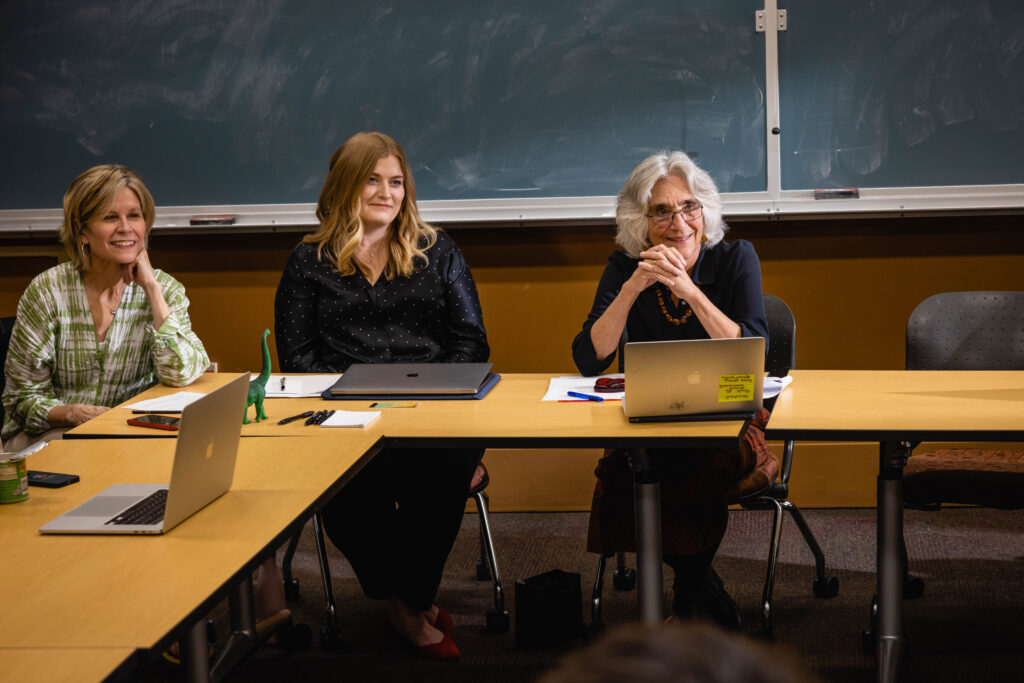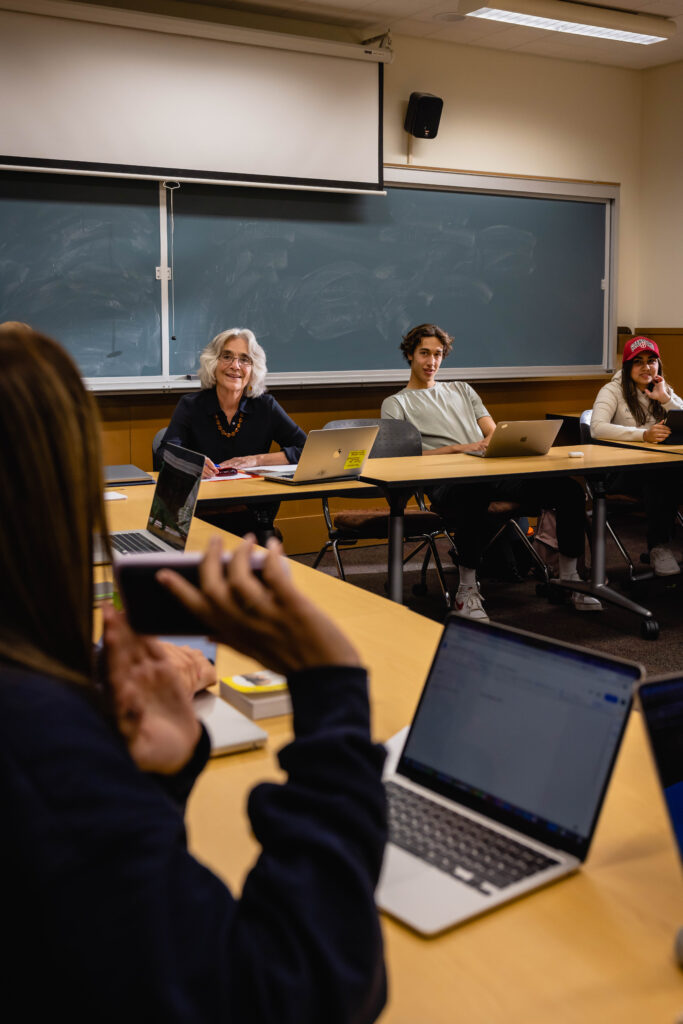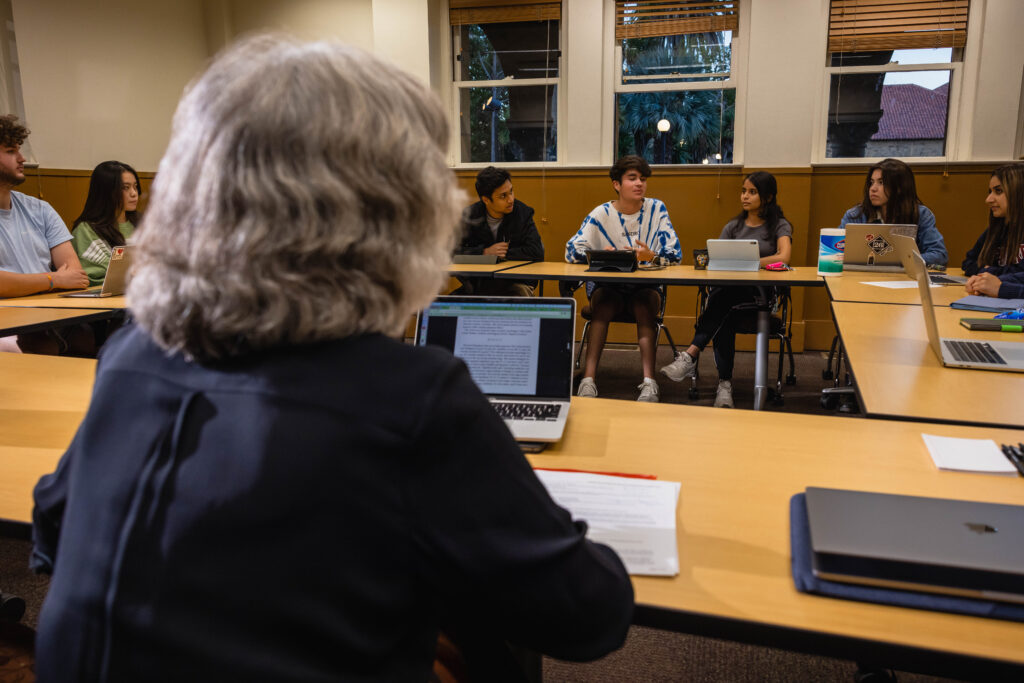COLLEGE prepares students for a lifetime of inquiry
Stanford’s newly restructured undergraduate requirement program encourages students to think critically across disciplines, reflect on their values, and consider how their education can lead them to purposeful lives.
“So, what experiments do you want to do?” Stanford Provost Persis Drell asked the classroom of first-year undergraduates.

Last quarter, Persis Drell (right), Theresa Iker (center), and Caroline Winterer taught Why College? Your Education and the Good Life. (Image credit: Courtesy Office of Development)
The question was posed during a seminar Drell recently co-taught, along with Stanford historian Caroline Winterer, last fall called Why College? Your Education and the Good Life. The course, which meets twice a week in small seminar sections, is the first of three classes that comprises Stanford’s newly restructured undergraduate requirement program, Civic, Liberal, and Global Education (COLLEGE).
For their Why College class that week, students had to read an academic review article about the influence of animal social hierarchies and stress. In the paper’s conclusion, the author asked whether some of the findings in the animal world could be applied to humans as well.
Drell asked the students to imagine they are researchers and how they might test and take further some of the author’s suggested applications. While the paper’s content was important to grasp, what Drell emphasized to the class of some 15 students was how imperative it is to ask questions, and to not always accept something as it appears to be.
A tenet of the COLLEGE program experience is to show students how to think for themselves and give them the skills to challenge assumptions and build arguments in thoughtful and effective ways.
Creating a shared curriculum and experience
Unlike previous iterations of the first-year requirement for students, COLLEGE is a shared curriculum. This quarter there are 1,055 undergraduates in 75 seminar-style sections who are taking Why College? Your Education and the Good Life.

In fall quarter, campus Provost Persis Drell co-taught a small seminar section of Why College? Your Education and the Good Life, the first of three classes that comprises Stanford’s newly restructured undergraduate requirement program. (Image credit: Courtesy Office of Development)
The syllabus for the class is the same – no matter what section a student is in, they are going to be reading identical materials. “We want students to have a shared intellectual experience,” said Dan Edelstein, one of the faculty directors for COLLEGE and the William H. Bonsall Professor of French in the School of Humanities and Sciences (H&S). “Students from different sections can still talk about themes, books, and assignments outside of class with their dormmates or friends.”
Classes are kept small to help encourage discussion and are taught by either a postdoctoral student or a faculty member from across the university – including campus leaders like Drell.
Drell is not the only campus leader teaching a COLLEGE seminar this quarter. Lloyd Minor, dean of Stanford School of Medicine, and Debra Satz, dean of Stanford School of Humanities and Sciences are both leading classes. As is Sarah Church, the Freeman-Thornton Vice Provost for Undergraduate Education, who led the university’s Coordinated First-Year Committee tasked with reimagining the first-year experience at Stanford.
While COLLEGE aims to establish a unifying, intellectual experience for students, another objective is to reaffirm the value of a liberal education that empowers students to seek purposeful lives in and beyond their chosen majors and career. “Teaching a liberal education has evolved over the years,” Church said, “but the goal hasn’t changed, which is to provide students with a broad education and a broad set of perspectives to have them grapple with questions about education, citizenship, and ethics.”
Decisions to change the undergraduate course requirement grew out of Stanford’s Long Range Vision and came after an extensive, formal review period during the university’s long-range planning process that found, among several other things, students were typically not choosing a Thinking Matters course outside of their primary interest. COLLEGE builds on Thinking Matters’ mission to stir intellectual curiosity by exploring a wide range of topics and perspectives. In May 2020, the faculty senate approved a four-year pilot phase of the COLLEGE program.
The first course in the COLLEGE sequence, Why College? Your Education and the Good Life, gives students the tools to navigate that journey and chart their own path. Students are encouraged to reflect on the place and purpose of college in their lives.
Church said she hopes that when students arrive at Stanford – after having gone through the intense pressure of applying and getting into college – they can “take a breath” to reflect on what they want from their education, away from demands they may feel from their family, friends, and peers.
“We want students to realize that they have a lot of opportunity, and some of the preconceived notions about what is important may not actually be true for them,” said Church, who is also the Pritzker University Fellow in Undergraduate Education. “They may want to pursue their education in a different way.”
Why College? Your Education and the Good Life aims to help put students on the path to self-discovery.
“There’s no box that we want students to fit into,” said Church.
But COLLEGE is not only about showing students how to make their experience at Stanford more meaningful. The program also seeks to encourage students to think deeply about their values and responsibilities as citizens and leaders, which are topics they explore in greater detail in the second and third quarters of the program.
In order to further cultivate the shared COLLEGE experience, a series of events and plenaries have been planned (Stanford’s Three Books program and author panels have been folded into the curricula). This quarter also saw the launch of the COLLEGE Faculty Fellow (CFF) Program, where a select group of the COLLEGE teaching faculty are paired to campus neighborhoods to bring additional programming into students’ residences.
This fall, four professors are bringing ideas and discussions that began in the classroom into dorms. The number could eventually increase to eight faculty members, with two in each neighborhood. This goal is being supported by a gift from Nehal Raj, ’00, MS ’00, who also endowed a lectureship to strengthen both H&S and COLLEGE.
Experiencing the process of inquiry
COLLEGE is also designed to help new students transition from high school into university. Students are also introduced to a diverse range of topics and authors to help train them to engage across disciplines and cultivate diverse skills.

In the course, Why College? Your Education and the Good Life, Stanford students were asked to reflect on the place and purpose of college in their life. (Image credit: Courtesy Office of Development)
There are readings from history, political science, philosophy, and the sciences – like the paper students read about the influence on animal social rank and stress, which was authored by Robert Sapolsky, the John A. and Cynthia Fry Gunn Professor and professor of neurology and of neurosurgery at Stanford.
For some students, this was their first time reading a scientific article, and helping students get comfortable with new kinds of academic material is a learning objective of the course as well (in her seminar with students, Drell shared some of her own strategies to get through academic texts. One tip: start with the conclusion first).
The Sapolsky paper, which was paired with an excerpt from social psychologist Jonathan Haidt’s book, The Happiness Hypothesis, was the basis for a larger question students were asked to contemplate that week related to the college experience: “Is higher education stressing us out?”
Drell found the Sapolsky paper a useful jumping-off point for inquiry – which was what she asked the class to ponder (the “what experiments do you want to do?” question).
She asked students to consider the question in small groups before reconvening to discuss it as a class. After chatting amongst themselves, students were eager to share how they would go about following up on some of the ideas in the paper.
Students deliberated amongst themselves back and forth, poking holes in arguments, peppering each other with questions, and at times, challenging assumptions – their own and those in the paper.
For example, they discussed how to study human socioeconomic status. A student wondered how to measure rank in the human world where one’s position in society is not always about economics, but also about reputation and respect.
The students also talked about ways to measure stress – a topic covered in the scientific paper – in people. One student pointed out that stress is a very personal, subjective experience; people handle it very differently.
In response, another student suggested looking at the hormones associated with stress. Yet, another added that those could also be compared against dopamine or serotonin, the hormones associated with happiness. He said people are used to certain amounts and therefore, changes to those levels could be evaluated. “That’s the delta and the derivatives there,” said Drell, giving names to the methodological approach the student suggested.
Throughout their lively discussion, which lasted about twenty minutes, students raised a range of other issues as well, from the effects of addiction to poverty. They also brought up other readings and research they had encountered, from classes and elsewhere.
The class appeared to be at ease with Drell, who has served as Stanford’s provost since 2017. Any nervousness they may have initially felt about being open and candid in front of the accomplished institutional leader seemed to have dissipated. Students frequently attended her dedicated office hours to talk about the course, but also life more broadly.
Critical thinking as a process and practice
What students were doing throughout their conversations was an example of critical thinking, Drell explained at the end of the class.
Winterer, the course co-instructor, further clarified to students what the word “critical” in critical thinking means. It is not to be confused with the other meaning associated with the word – expressing dislike or disapproval – but rather, the process of objectively analyzing and evaluating an issue in order to form a judgment.
“What we mean by critical is first identifying what someone is trying to say and what evidence they are using to defend their position,” said Winterer, chair of the History Department and the William Robertson Coe Professor of History and American Studies in H&S.
It’s also about evaluating evidence being put forward. “Unlike a knee-jerk response, it’s a process of inquiry and a process of encounter with other critical minds,” she added. “That’s really what we’re trying to teach you in four years at the university – that learning is a process of inquiry, and it’s a process that can be learned.”
COLLEGE courses are taught by COLLEGE teaching fellows, who specialize in teaching in the interdisciplinary first-year requirement program. This fall, the fellows were joined by 11 faculty members, including Drell and Winterer, along with several lecturers from across the university. Assisting Drell and Winterer in the course is Theresa Iker, a PhD candidate in United States history.
Teaching with such accomplished faculty colleagues has brought her incredible joy, Drell said.
She spoke highly of the COLLEGE program from the perspective of an instructor during a faculty senate meeting last November. “It has been a fantastic experience. I have not had this much fun academically, probably it’s fair to say in decades,” she said. “I have learned so much. The students are fabulous. It has helped me realize that the narratives around what undergraduates may be like and their reluctance to have serious conversations or address challenging topics in the classroom couldn’t be farther from reality, for at least some courses.”
Students have already been asking about how to have the same kinds of deep conversations they have in class outside of it. The expanding COLLEGE Faculty Fellow Program will help foster deeper engagement with course materials beyond the classroom and within residences. In the meantime, Drell encouraged students to not just have opinions but to keep asking each other questions.
She encouraged students to challenge assumptions – both their own and that of others. “You’ve got to watch out for common sense,” she reminded the class.
Finally, Drell encouraged her students to always remain open to new ideas. “You can never know enough information. You can always learn from somebody else. Just taking those techniques, being a little conscious and thoughtful about it, is one of the goals of this course.”
Drell is also the James and Anna Marie Spilker Professor and professor in the School of Engineering, professor of materials science and engineering, and of physics.
This story is part of an ongoing, in-depth series by Stanford Report exploring the COLLEGE program.
Stanford faculty are invited to teach in COLLEGE and can find out more about it on the COLLEGE website here.